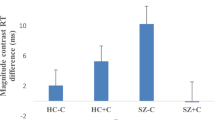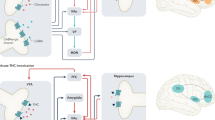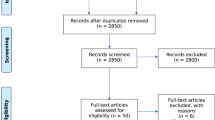Abstract
Drug abuse and other psychiatric conditions (eg, schizophrenia) have been associated with a diminished neural response to errors, particularly in the anterior cingulate cortex (ACC) thought critical to error processing. A diminished capacity for detecting errors has been linked to clinical symptoms including the loss of insight, delusions, and perseverative behavior. A total of 16 active chronic cannabis users and 16 control participants were administered a Go/No-go response inhibition task during event-related fMRI data collection. The task provides measures of inhibitory control and error awareness. Cannabis users’ inhibitory control performance was equivalent to that of the control group, but the former showed a significant deficit in awareness of commission errors. Cannabis users showed a diminished capacity for monitoring their behavior that was associated with hypoactivity in the ACC and right insula. In addition, increased levels of hypoactivity in both the ACC and right insula regions were significantly correlated with error-awareness rates in the cannabis group (but not controls). These difficulties are consistent with earlier reports of hypoactivity in the neural systems underlying cognitive control and the monitoring of interoceptive awareness in chronic drug users, and highlight the potential relationship between cognitive dysfunction and behavioral deficits that have the potential to contribute to the maintenance of drug abuse.
Similar content being viewed by others
Log in or create a free account to read this content
Gain free access to this article, as well as selected content from this journal and more on nature.com
or
References
Alain C, McNeely HE, He Y, Christensen BK, West R (2002). Neurophysiological evidence of error-monitoring deficits in patients with schizophrenia. Cereb Cortex 12: 840–846.
Bates AT, Kiehl KA, Laurens KR, Liddle PF (2002). Error-related negativity and correct response negativity in schizophrenia. Clin Neurophysiol 113: 1454–1463.
Bolla K, Ernst M, Kiehl K, Mouratidis M, Eldreth D, Contoreggi C et al (2004). Prefrontal cortical dysfunction in abstinent cocaine abusers. J Neuropsychiatry Clin Neurosci 16: 456–464.
Carter CS, MacDonald III AW, Ross LL, Stenger VA (2001). Anterior cingulate cortex activity and impaired self-monitoring of performance in patients with schizophrenia: an event-related fMRI study. Am J Psychiatry 158: 1423–1428.
Cox RW (1996). AFNI: software for analysis and visualization of functional magnetic resonance neuroimages. Comput Biomed Res 29: 162–173.
Craig AD (2009). How do you feel - now? The anterior insula and human awareness. Nat Rev Neurosci 10 (January): 59–70.
Eldreth DA, Matochik JA, Cadet JL, Bolla KI (2004). Abnormal brain activity in prefrontal brain regions in abstinent marijuana users. Neuroimage 23: 914–920.
Forman SD, Dougherty G, Casey BJ, Siegle G, Braver T, Barch D et al (2004). Opiate addicts lack error-dependent activation of rostral anterior cingulate. Biol Psychiatry 55: 531–537.
Frith CD (1987). The positive and negative symptoms of schizophrenia reflect impairments in the perception and initiation of action. Psychol Med 17: 631–648.
Frith CD, Done DJ (1989). Experiences of alien control in schizophrenia reflect a disorder in the central monitoring of action. Psychol Med 19: 359–363.
Garavan H, Hester R, Fassbender C (2003). The Impact of Individual Differences and Prefrontal Control on Action Monitoring Revealed Through fMRI. In: Ullsperger M, Falkenstein M (eds). Errors, Conflicts, and the Brain. Current Opinions on Performance Monitoring. MPI of Cognition: Leipzig, pp 151–172.
Garavan H, Hester R, Murphy K, Fassbender C, Kelly C (2006). Individual differences in the functional neuroanatomy of inhibitory control. Brain Res 1105: 130–142.
Garavan H, Ross TJ, Murphy K, Roche RA, Stein EA (2002). Dissociable executive functions in the dynamic control of behavior: inhibition, error detection, and correction. Neuroimage 17: 1820–1829.
Goldstein RZ, Volkow ND (2002). Drug addiction and its underlying neurobiological basis: neuroimaging evidence for the involvement of the frontal cortex. Am J Psychiatry 159: 1642–1652.
Gray MA, Critchley HD (2007). Interoceptive basis to craving. Neuron 54: 183–186.
Gruber SA, Yurgelun-Todd DA (2005). Neuroimaging of marijuana smokers during inhibitory processing: a pilot investigation. Brain Res Cogn Brain Res 23: 107–118.
Heishman SJ, Singleton EG, Liguori A (2001). Marijuana Craving Questionnaire: development and initial validation of a self-report instrument. Addiction 96: 1023–1034.
Hester R, Foxe JJ, Molholm S, Shpaner M, Garavan H (2005). Neural mechanisms involved in error processing: a comparison of errors made with and without awareness. Neuroimage 27: 602–608.
Hester R, Simoes-Franklin C, Garavan H (2007). Post-error behavior in active cocaine users: poor awareness of errors in the presence of intact performance adjustments. Neuropsychopharmacology 32: 1974–1984.
Kalivas PW, Volkow ND (2005). The neural basis of addiction: a pathology of motivation and choice. Am J Psychiatry 162: 1403–1413.
Kaufman JN, Ross TJ, Stein EA, Garavan H (2003). Cingulate hypoactivity in cocaine users during a GO/NOGO task as revealed by event-related fMRI. J Neurosci 23: 7839–7843.
Kelly AM, Hester R, Murphy K, Javitt D, Foxe J, Garavan H (2004). Prefrontal-subcortical dissociations underlying inhibitory control revealed by event-related fMRI. Eur J Neurosci 19: 3105–3112.
Keppel G (1991). Design and Analysis: A Researcher's Handbook. Prentice Hall-Englewood Cliffs: New Jersey.
Kerns JG, Cohen JD, Macdonald III AW, Johnson MK, Stenger VA, Aizenstein H et al (2005). Decreased conflict- and error-related activity in the anterior cingulate cortex in subjects with schizophrenia. Am J Psychiatry 162: 1833–1839.
Klein TA, Endrass T, Kathmann N, Neumann J, von Cramon DY, Ullsperger M (2007). Neural correlates of error awareness. Neuroimage 34: 1774–1781.
Laurens KR, Ngan ET, Bates AT, Kiehl KA, Liddle PF (2003). Rostral anterior cingulate cortex dysfunction during error processing in schizophrenia. Brain 126 (Part 3): 610–622.
Liotti M, Pliszka SR, Perez R, Kothmann D, Woldorff MG (2005). Abnormal brain activity related to performance monitoring and error detection in children with ADHD. Cortex 41 (3): 377–388.
London ED, Berman SM, Voytek B, Simon SL, Mandelkern MA, Monterosso J et al (2005). Cerebral metabolic dysfunction and impaired vigilance in recently abstinent methamphetamine abusers. Biol Psychiatry 58: 770–778.
Lysaker PH, Bell MD, Bryson G, Kaplan E (1998). Neurocognitive function and insight in schizophrenia: support for an association with impairments in executive function but not with impairments in global function. Acta Psychiatr Scand 97: 297–301.
Mostofsky SH, Schafer JG, Abrams MT, Goldberg MC, Flower AA, Boyce A et al (2003). fMRI evidence that the neural basis of response inhibition is task-dependent. Cogn Brain Res 17: 419–430.
Murphy K, Garavan H (2005). Deriving the optimal number of events for an event-related fMRI study based on the spatial extent of activation. Neuroimage 27: 771–777.
Naqvi NH, Rudrauf D, Damasio H, Bechara A (2007). Damage to the insula disrupts addiction to cigarette smoking. Science 315: 531–534.
Nieuwenhuis S, Ridderinkhof KR, Blom J, Band GP, Kok A (2001). Error-related brain potentials are differentially related to awareness of response errors: evidence from an antisaccade task. Psychophysiology 38: 752–760.
O’Connell RG, Dockree PM, Bellgrove MA, Kelly SP, Hester R, Garavan H et al (2007). The role of cingulate cortex in the detection of errors with and without awareness: a high-density electrical mapping study. Eur J Neurosci 25: 2571–2579.
Paulus MP (2007). Decision-making dysfunctions in psychiatry—altered homeostatic processing? Science 318: 602–606.
Pope Jr HG, Gruber AJ, Hudson JI, Huestis MA, Yurgelun-Todd D (2001). Neuropsychological performance in long-term cannabis users. Arch Gen Psychiatry 58: 909–915.
Ridderinkhof KR, de Vlugt Y, Bramlage A, Spaan M, Elton M, Snel J et al (2002). Alcohol consumption impairs detection of performance errors in mediofrontal cortex. Science 298: 2209–2211.
Ridderinkhof KR, Ullsperger M, Crone EA, Nieuwenhuis S (2004). The role of the medial frontal cortex in cognitive control. Science 306: 443–447.
Rubia K, Smith AB, Brammer MJ, Toone B, Taylor E (2005). Abnormal brain activation during inhibition and error detection in medication-naive adolescents with ADHD. Am J Psychiatry 162: 1067–1075.
Saad Z, Ropella K, DeYoe E, Bandettini P (2003). The spatial extent of the BOLD response. NeuroImage 19: 132–144.
Seltzer B, Vasterling JJ, Yoder JA, Thompson KA (1997). Awareness of deficit in Alzheimer's disease: relation to caregiver burden. Gerontologist 37: 20–24.
Solowij N, Stephens RS, Roffman RA, Babor T, Kadden R, Miller M et al (2002). Cognitive functioning of long-term heavy cannabis users seeking treatment. JAMA 287: 1123–1131.
Steele JD, Kumar P, Ebmeier KP (2007). Blunted response to feedback information in depressive illness. Brain 130 (Part 9): 2367–2374.
Tapert SF, Schweinsburg AD, Drummond SP, Paulus MP, Brown SA, Yang TT et al (2007). Functional MRI of inhibitory processing in abstinent adolescent marijuana users. Psychopharmacology (Berl) 194: 173–183.
Turken AU, Vuilleumier P, Mathalon DH, Swick D, Ford JM (2003). Are impairments of action monitoring and executive control true dissociative dysfunctions in patients with schizophrenia? Am J Psychiatry 160: 1881–1883.
Ullsperger M (2006). Performance monitoring in neurological and psychiatric patients. Int J Psychophysiol 59: 59–69.
Ullsperger M, von Cramon DY (2001). Subprocesses of performance monitoring: a dissociation of error processing and response competition revealed by event-related fMRI and ERPs. Neuroimage 14: 1387–1401.
Acknowledgements
This research was supported by USPHS grant from the National Institute on Drug Abuse: DA01865-01, Australian Research Council Grant (RH) DP0556602 and Australian National Health and Medical Research Council Career Development Award 519730 (RH). The assistance of Gloria Roberts, Gina Joue, Jennifer Jones, and Ella McCabe are gratefully acknowledged.
Author information
Authors and Affiliations
Corresponding author
Additional information
DISCLOSURE/CONFLICT OF INTEREST
Drs Hester, Nestor, and Garavan reported no biomedical financial interests or potential conflict of interest.
Rights and permissions
About this article
Cite this article
Hester, R., Nestor, L. & Garavan, H. Impaired Error Awareness and Anterior Cingulate Cortex Hypoactivity in Chronic Cannabis Users. Neuropsychopharmacol 34, 2450–2458 (2009). https://doi.org/10.1038/npp.2009.67
Received:
Revised:
Accepted:
Published:
Issue date:
DOI: https://doi.org/10.1038/npp.2009.67
Keywords
This article is cited by
-
Common hyper-entropy patterns identified in nicotine smoking, marijuana use, and alcohol use based on uni-drug dependence cohorts
Medical & Biological Engineering & Computing (2023)
-
The neurobiology of drug addiction: cross-species insights into the dysfunction and recovery of the prefrontal cortex
Neuropsychopharmacology (2022)
-
Meta-analysis Provides Weak Evidence for an Effect of Mindfulness on Neural Activity Related to Error-Processing in Healthy Individuals Only
Mindfulness (2022)
-
Recreational drug use and prospective memory
Psychopharmacology (2022)
-
Disrupted parahippocampal and midbrain function underlie slower verbal learning in adolescent-onset regular cannabis use
Psychopharmacology (2021)



